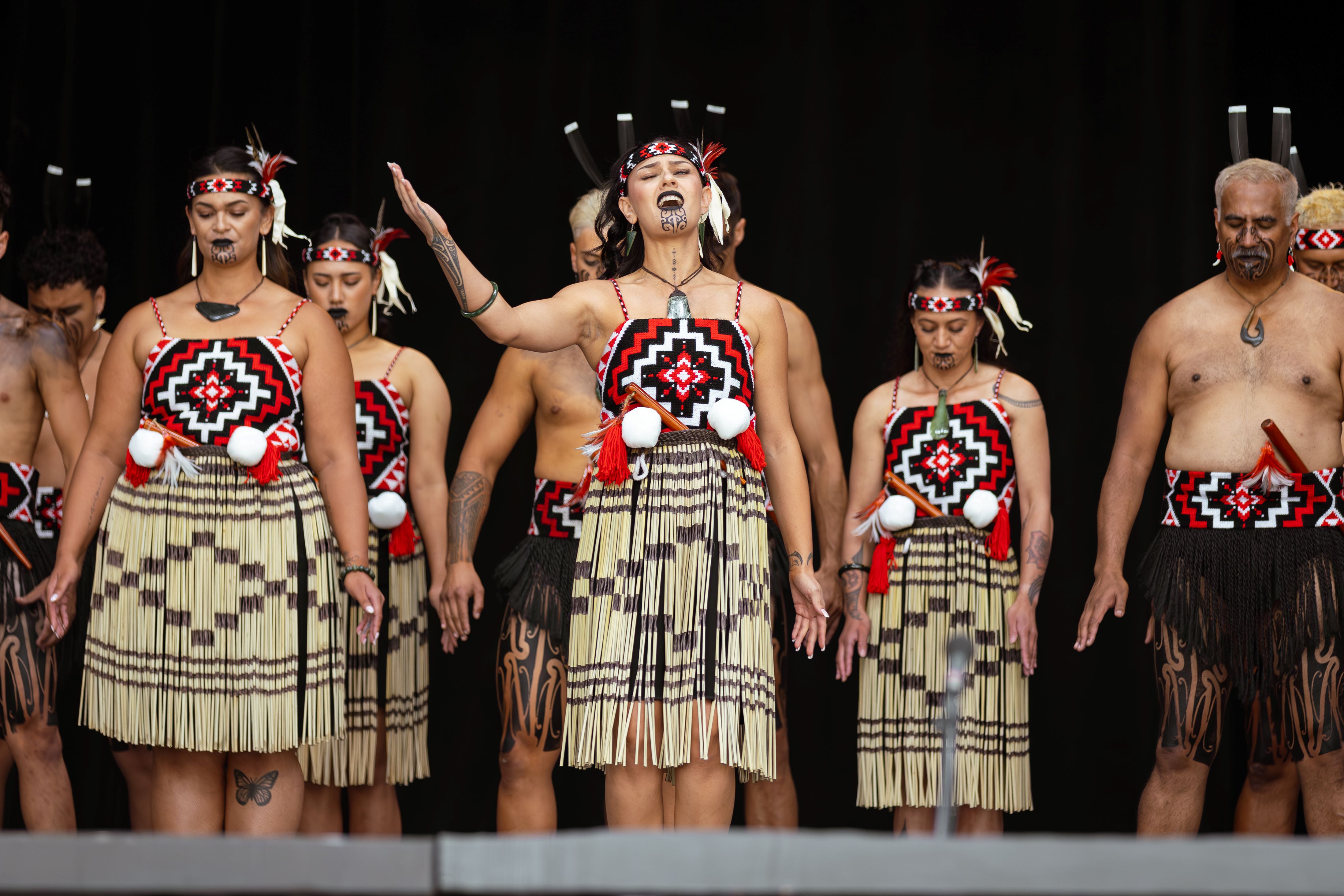Nelson’s viral kapa haka pair


Naia Awatea performing with Te Kuru Marutea at Te Matatini o Te Kāhui Maunga in March. Photo: Te Matatini Enterprises
When a video of two Nelson singers performing at the top kapa haka competition in the country started going viral, it tapped into something special that the pair were sharing with the world. Charles Anderson reports.
Somewhere in a family archive, there is a photo of a young Bailee Tava with an equally young Naia Awatea, dressed in full kapa haka garb. They are about five years old, participating in one of their first kapa haka competitions. It is a memory that seems so distant considering the journey the pair have now been on.
From then, that moment as children, the pair worked over the years with their respective groups until they came together in the Te Tauihu group Te Kuru Marutea.
Their performance with the group at Te Matatini o Te Kāhui Maunga in March not only won the first Kohine Ponika “People's Choice” award, but also captured the hearts of online audiences.
The video in question begins with Naia singing the lyrics to Kei Wareware i a Tātou: “Wheuri te pō, Tirama ana ngā whetū piataata.”
In English it translates as: “In the deep dark night, the bright stars twinkle in the sky.”
It is a haunting and beautiful start to a waiata that talks of longing and remembrance of those who have passed.
Before long, Bailee joins in the song. Their voices seem like they have melded together – contrasting in power and energy but perfectly complementary.
“I think a lot of people notice how different our voices are,” Bailee says. “With Naia coming in, and her very soft, beautiful sound opens up that waiata.”
Their combination, along with the chorus of Te Kuru Marutea, struck a chord. There was something about the passion, the emotion, and the song itself that catapulted it into the national and then international spotlight. Versions of the performance have now been viewed almost 50 million times across social media – Instagram, Facebook and TikTok.
Comments poured in, expressing the profound impact of their voices. One TikTok commenter wrote, “I've said this before and I'll keep saying it – Māori vocals will ALWAYS have my heart,” adding, “It hits so different!” Another praised, “Both soloists killed it, fav solos so far,” while a third shared, “I’m glad someone captured it, ‘cause damn, it was so stunning that it just kept replaying in my mind over and over.”
It was a far cry from where both of them began.
Both born and bred in Nelson, Bailee recalls her initiation into kapa haka at the tender age of four or five with the club Te Tauihu Kura. Her first tutor was Wayne Hippolite, and she has been involved with him ever since. This early exposure was no accident; Bailee's parents were also involved in kapa haka and introduced their children to the same club. The group’s current tutor is cousin, Tom Alesana.
It was when Bailee was in primary school that her dad brought her sister and her together to sing.
When she was about eight, Bailee started getting solos in those groups. Then came talent shows, when her voice really started to shine. A “Richmond’s Got Talent” competition saw Bailee perform Miley Cryus’ The Climb with her sister Hana, and another climb began.

Bailee has performed alongside Naia for many years, solidifying not just their artistic partnership but their familial bond. They are, after all, also cousins.
“Most of the group are family,” Bailee laughs.
It was that part of kapa haka that always kept them coming back.
“The social side. I just love,” Bailee says. “Being able to see my friends and whānau all the time. It's just something that we all love to do together.”
For Naia too, kapa haka is a family affair.
“My brother is my haka idol,” she told Tahu FM. “He is my favourite kaihaka to watch. I feel it's a little bit biased but… he keeps me pushing.”
For Bailee and Naia, the viral explosion was entirely unexpected.
As Naia explained, they always knew the waiata was beautiful and sang it with passion, especially because of their connection to their rohe (region). However, they “never expected anything to make a statement,” so the widespread attention was a complete surprise.
Bailee echoed this sentiment.
“You don't really go to [Te Matatini] and go ‘Oh yes, I'm going to go viral’, you go there to perform and represent your rohe and I suppose this was just a bonus.”
The reality of their newfound fame hit them after their performance. Having been engrossed in the festival, they hadn't checked their phones. It was during dinnertime that they were “bombarded” with notifications, realising they had gone viral within the last two hours. Soon after, they received a call from Te Matatini organisers, who, anticipating their win for the People's Choice award, asked them to film a video for their social media platforms.
This moment solidified the reality of their viral success.
The waiata, Kei Wareware i a Tātou, resonated deeply with audiences for several reasons. Bailee believes the emotion conveyed through the song, even for those who don't understand the Māori language, was a key factor.
The mamae (hurt) behind the waiata – a remembrance of loved ones – was palpable in their voices and performance. The waiata, gifted and composed by Latoya Leef-Graham, Charlton Te Wake-Matthews, and Margaret Ngaropo Hati, is a song of healing, sharing grief, and encouraging community support during difficult times.
“I think the emotion behind the waiata, even for those who aren't Māori and don’t understand the waiata, is something you can see and hear in our voices and in our performance… the mamae, or the hurt that there's behind that waiata and remembering our loved ones.”
She says that it has also resonated with indigenous people around the world.
“Indigenous people who are away from their place of belonging.”
This theme of remembrance and loss particularly hit hard for Bailee and their group, as they had experienced significant loss in the lead-up to the competition. For Bailee personally, the waiata evoked memories of deceased family members and those who had been a crucial part of their campaign but were no longer with them.
“It was really more about that, remembering those who have been a big part of our campaign, but who we lost along the way.”
But it was a long time coming and a group effort to get ready for the competition.
“It's hard work,” says Bailee. “It's usually about three to four months of training to then build up to that moment for that 25 minutes on stage.”
She says all the group goes there to represent their rohe, but then to be noticed for it is just the bonus.
For Naia, the other benefit of their success was allowing people to see Te Waipounamu kapa haka groups in the spotlight.
“It’s never been the goal that we always want to be known and recognised and to be that group, but now we have a little bit of a taste of that. We don't know how to navigate that yet, but it's exciting.”
Bailee, who moved to Auckland in January and works as a full-time teacher for Year 5 and 6 students, found her life changing. Her students were thrilled by her newfound fame, though she modestly downplayed it. They frequently requested to listen to the waiata in class.
“They think I'm famous. I'll take it. They love it. They want to listen to it all the time in class, I always have to say, ‘Only one time today.’”
While Bailee has received approaches from people regarding her music, she is taking things as they came, content with her teaching career but open to future possibilities.
Naia, who has her own artist channel on Spotify, has also experienced increased attention.
The viral success of Kei Wareware i a Tātou undoubtedly boosted her profile and provided a larger platform for her musical endeavours. She also participated in promotional videos for Te Matatini, further highlighting the impact of their performance.
One such video featured Māori content creator Te Aorere Pewhairangi playfully being interrupted by Naia in his kitchen as he sang along to their viral hit, all to announce an upcoming Te Matatini album.
“I feel there’s a bit of pressure now that so many people are watching all of a sudden that I have to put my all into my songs now. It’s not just small, little muck-arounds – people are watching.”
The impact of Bailee’s and Naia’s performance extends beyond viral views and accolades. Their captivating vocals and the emotional depth of Kei Wareware i a Tātou have brought the beauty and power of Māori performing arts to a global audience. Their success highlights the ability of kapa haka to transcend cultural boundaries and resonate with universal human experiences of love, loss, and remembrance.
The core of the song is simple for Bailee.
“It’s not a horrible thing that these people have passed. It was their time, and this is us making time and space to let them go.”
